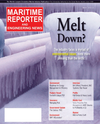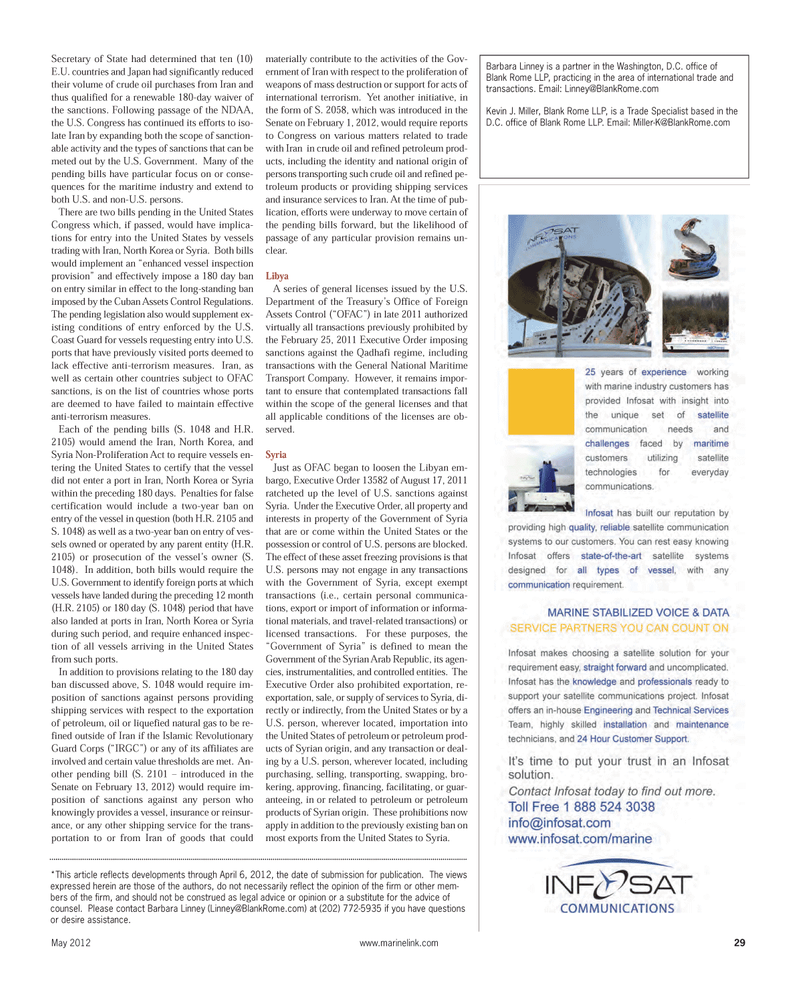
Page 29: of Maritime Reporter Magazine (May 2012)
The Green Ship Edition
Read this page in Pdf, Flash or Html5 edition of May 2012 Maritime Reporter Magazine
Secretary of State had determined that ten (10)E.U. countries and Japan had significantly reduced their volume of crude oil purchases from Iran and thus qualified for a renewable 180-day waiver of the sanctions. Following passage of the NDAA, the U.S. Congress has continued its efforts to iso- late Iran by expanding both the scope of sanction- able activity and the types of sanctions that can be meted out by the U.S. Government. Many of the pending bills have particular focus on or conse- quences for the maritime industry and extend to both U.S. and non-U.S. persons.There are two bills pending in the United States Congress which, if passed, would have implica- tions for entry into the United States by vessels trading with Iran, North Korea or Syria. Both bills would implement an ?enhanced vessel inspection provision? and effectively impose a 180 day ban on entry similar in effect to the long-standing ban imposed by the Cuban Assets Control Regulations. The pending legislation also would supplement ex- isting conditions of entry enforced by the U.S.Coast Guard for vessels requesting entry into U.S. ports that have previously visited ports deemed to lack effective anti-terrorism measures. Iran, as well as certain other countries subject to OFAC sanctions, is on the list of countries whose portsare deemed to have failed to maintain effective anti-terrorism measures.Each of the pending bills (S. 1048 and H.R.2105) would amend the Iran, North Korea, and Syria Non-Proliferation Act to require vessels en- tering the United States to certify that the vessel did not enter a port in Iran, North Korea or Syria within the preceding 180 days. Penalties for false certification would include a two-year ban on entry of the vessel in question (both H.R. 2105 and S. 1048) as well as a two-year ban on entry of ves- sels owned or operated by any parent entity (H.R. 2105) or prosecution of the vessel?s owner (S. 1048). In addition, both bills would require the U.S. Government to identify foreign ports at which vessels have landed during the preceding 12 month (H.R. 2105) or 180 day (S. 1048) period that have also landed at ports in Iran, North Korea or Syria during such period, and require enhanced inspec-tion of all vessels arriving in the United States from such ports. In addition to provisions relating to the 180 day ban discussed above, S. 1048 would require im- position of sanctions against persons providing shipping services with respect to the exportation of petroleum, oil or liquefied natural gas to be re- fined outside of Iran if the Islamic Revolutionary Guard Corps (?IRGC?) or any of its affiliates are involved and certain value thresholds are met. An- other pending bill (S. 2101 ? introduced in theSenate on February 13, 2012) would require im- position of sanctions against any person who knowingly provides a vessel, insurance or reinsur- ance, or any other shipping service for the trans- portation to or from Iran of goods that couldmaterially contribute to the activities of the Gov- ernment of Iran with respect to the proliferation ofweapons of mass destruction or support for acts ofinternational terrorism. Yet another initiative, in the form of S. 2058, which was introduced in the Senate on February 1, 2012, would require reports to Congress on various matters related to trade with Iran in crude oil and refined petroleum prod- ucts, including the identity and national origin ofpersons transporting such crude oil and refined pe- troleum products or providing shipping services and insurance services to Iran. At the time of pub- lication, efforts were underway to move certain of the pending bills forward, but the likelihood of passage of any particular provision remains un- clear. Libya A series of general licenses issued by the U.S.Department of the Treasury?s Office of Foreign Assets Control (?OFAC?) in late 2011 authorized virtually all transactions previously prohibited by the February 25, 2011 Executive Order imposing sanctions against the Qadhafi regime, including transactions with the General National MaritimeTransport Company. However, it remains impor- tant to ensure that contemplated transactions fall within the scope of the general licenses and thatall applicable conditions of the licenses are ob-served. SyriaJust as OFAC began to loosen the Libyan em- bargo, Executive Order 13582 of August 17, 2011 ratcheted up the level of U.S. sanctions against Syria. Under the Executive Order, all property and interests in property of the Government of Syria that are or come within the United States or thepossession or control of U.S. persons are blocked. The effect of these asset freezing provisions is that U.S. persons may not engage in any transactions with the Government of Syria, except exempt transactions (i.e., certain personal communica-tions, export or import of information or informa- tional materials, and travel-related transactions) or licensed transactions. For these purposes, the ?Government of Syria? is defined to mean the Government of the Syrian Arab Republic, its agen- cies, instrumentalities, and controlled entities. The Executive Order also prohibited exportation, re- exportation, sale, or supply of services to Syria, di- rectly or indirectly, from the United States or by a U.S. person, wherever located, importation into the United States of petroleum or petroleum prod-ucts of Syrian origin, and any transaction or deal- ing by a U.S. person, wherever located, including purchasing, selling, transporting, swapping, bro- kering, approving, financing, facilitating, or guar- anteeing, in or related to petroleum or petroleumproducts of Syrian origin. These prohibitions now apply in addition to the previously existing ban on most exports from the United States to Syria. May 2012www.marinelink.com 29Barbara Linney is a partner in the Washington, D.C. office of Blank Rome LLP, practicing in the area of international trade and transactions. Email: [email protected] J. Miller, Blank Rome LLP, is a Trade Specialist based in the D.C. office of Blank Rome LLP. Email: [email protected] *This article reflects developments through April 6, 2012, the date of submission for publication. The views expressed herein are those of the authors, do not necessarily reflect the opinion of the firm or other mem- bers of the firm, and should not be construed as legal advice or opinion or a substitute for the advice ofcounsel. Please contact Barbara Linney ([email protected]) at (202) 772-5935 if you have questionsor desire assistance. MR May 12 # 4 (25-33):MR Template 4/27/2012 11:33 AM Page 29

 28
28

 30
30
